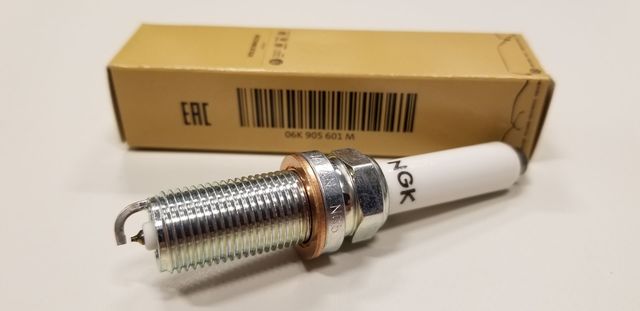Choosing the correct spark plug for any application is a controversial subject. Everyone has their own opinion and there is a very large lack of understanding on how these spark plugs are selected. A lot of the information stated on the internet in regards to cold heat range plugs and their purpose is also incorrect. I will try my best to explain our selection process on the plugs we use and why.
We use stock factory spark plugs on engines running on 98/99 octane fuel. The part number of these plugs is 06K 905 601 M / SILFER8C7ES / NGK 91006. You can purchase them from Any Audi/Vw dealer or TPS. The factory heat range is 8. The plug gap is 0.0028”.
Their are companies out there suggesting the use of NGK R7437-9 spark plugs or worse yet NGK R7438-8/R7438-9 plugs. These are the wrong spark plugs for gasoline based applications.
The R7437-9 is a heat range 9 spec plug. If you run this plug and pull it out after 1-2k miles, you will notice it is heavily fouled with carbon deposits. This is a big problem because a fouled plug cannot clean itself which reduces engine efficiency, reduces MPG, causes a stumble on idle and gives you rough cold starts/misfires.
The NGK R7438 plug is not designed for this engine. It is a non-projected design and the ceramic doesn't extend past the threaded portion and again is completely the wrong spark plug for the 5 cylinder engine. The gap is also substantially smaller, reducing the gap on any spark plug reduces the combustion efficiency and should only ever be done on extremely high boost applications to reduce spark plug blowout, otherwise you will lose power.
There is a disturbing misconception that using colder heat range pulls more heat out of the combustion chamber. This is wrong, the amount of heat removed from the combustion chamber is absolute minimal. The evidence to back this up comes from monitoring exhaust gas temperatures using a physical sensor, you can go as cold as three steps colder than stock, exhaust gas temperatures will not change.
The other misconception of the reasoning behind fitting a colder heat range plug is that it reduces detonation. This is also false, the heat range of a plug does NOT have any influence on detonation.
The phenomenon of detonation can be understood as follows: Initially, the air-fuel mixture ignites between the spark plug gap. As the flame front advances throughout the chamber, detonation occurs when the unburnt fuel ahead of the flame front becomes compressed and heated to the extent that it spontaneously combusts (explodes), rather than undergoing a controlled combustion process by the flame front. This explosion of fuel generates pressure waves that propagate in the direction opposite to the advancing flame front (and piston), resulting in a distinctive frequency picked up by the knock sensor and what follows is that the engine retards ignition to stop this happening. Since detonation occurs on the opposite side of the chamber from the spark plug, it neither influences nor can be influenced by the ignition process.
On an improper calibration, going to a colder plug prolongs the life of the plug by an additional few milliseconds per heat range, but it will not prolong the life of the pistons/combustion chamber during detonation. It will NOT stop the plug from melting from a bad calibration. It is of my opinion using incorrect plugs on this platform transpires from companies using spark plugs as a bandaid for improper calibrations on the ECU OR general misinformation on the internet.
Now what is the use case of a colder heat range plug? Engines running on Ethanol or Methanol (in the fuel system, not water meth injection) should be running colder plugs, this is to prevent pre ignition. The purpose of a colder range plug is to reduce the heat retained by the ceramic tip. This heat is induced by the combustion process. Ethanol and Methanol are prone to pre ignition. If the stock plug can't remove that added heat fast enough, it will become so hot that the incoming fuel and air will ignite before the spark plug ignites the mixture. This is preignition and is extremely bad for engines. Pre ignition is not something that can be picked up by knock sensors. How do you know if you have pre ignition? Usually it’s too late, you end up with a hole in the piston or the combustion chamber. For Ethanol applications we recommend NGK R7437-9 and for Methanol we recommend R7437-10.
#daza #dnwa #dnwc #czgb #cepa


